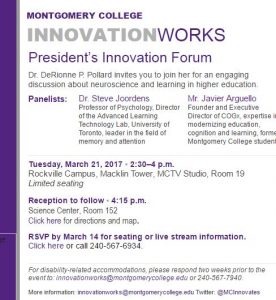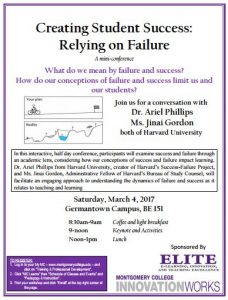Learning: an Art or a Science? Call for Submissions
Is learning art or science? With advances in technology and learning sciences, we have the opportunity to understand how people learn better than ever before. However, the question of whether learning is an art or if it can be scientifically facilitated or, if it is both, is before us.
Is learning a product of belief? Experience and research shows that what one believes about one’s own intelligence impacts the goals one sets and the persistence demonstrated to reach those goals. Increasingly, faculty are learning that what a teacher believes about a student shapes his or her expectations about the student’s ability, and reciprocally impacts the student’s self-perception. Our beliefs about teaching and learning impact the learning environment we create.
Is learning a science? Now that technological leaps are allowing us to map the brain and understand how cognition functions, we can begin to see the relationships between thoughts, learning and emotions. We can apply this research to help students learn better through technological intervention and practical application.
This year ELITE and Montgomery College Innovation Works are sponsoring a series of professional development focuses on the question of learning. Two signature events for this theme are:
“Creating Student Success: Relying on Failure”
March 4, 2017
8:30-1 pm with lunch
A half day conference with Dr. Ariel Phillips and Ms. Jinai Gordon of Harvard University focuses on how beliefs about failure can shape student success.
Conference information
The Spring 2017 President’s Innovation Forum
Neuroscience and Learning
March 21, 2017
2:30-4:00 pm
With Dr. Steve Joordens and Mr. Javier Arguello
Focuses on the intersection of neuroscience, technology and improving student learning
The Montgomery College Innovation Journal, a modestly peer reviewed multimedia, digital journal, invites submissions (text, video, or visual images) with a focus on improving learning inspired by either of the events above or any of the associated readings listed below. Submissions can focus on a discussion of any of the related themes: neuroscience and the learning sciences, technology enabled learning, metacognitive development, mindset, or success/failure beliefs. Submissions should focus on concrete ideas for implementation or reflections on current instructional practices. Submissions could include a description of possible activities or currently implemented activities, expected impact, any data or results observed, and reflections on the effectiveness, practicality, feasibility, sustainability, and scalability of the initiatives. The journal welcomes group or individual authors, and encourages the inclusion of student, staff and faculty reflections
Text submissions should be 1500-2000 words. Infographics or other visual images or videos should be accompanied by a short (at least 500 word) explanation of the idea, project or activity. The journal welcomes group or individual authors, and encourages the inclusion of student, staff and faculty reflections.
Resources to consider
Making Sense of Neuroscience Research



